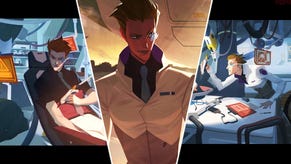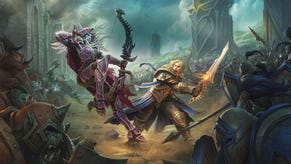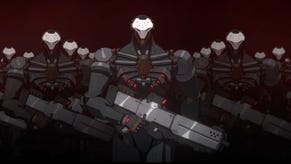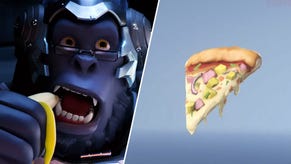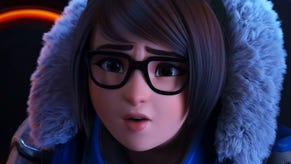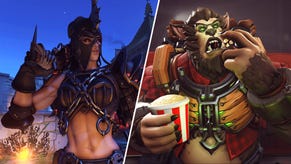Overwatch: Blizzard's Scott Mercer on what's fun, fair and foul in Competitive Mode
Why everyone stands a chance of getting something, while only the best deserve more.
Competitive Play mode is rolling out in Overwatch on PC and console, putting reputations on the line in pursuit of shining glory. After a very thorough and informative beta trial, Blizzard has settled upon what it believes is the most enjoyable iteration of its most hotly contested PvP arena. We spoke with Principal Game Designer at Blizzard Scott Mercer to learn about player progression, skill-based rewards and wider reaching reasons to take part.
Oh, and there was that small matter of hero stacking too… yeah, not everyone is going to like the answer to that one. But, see what you make of Scott’s clearly very careful mission statements, and please do add your equally considered comments in the section below.
"The Top 500 players will have a number associated with them, so you will have a number one guy or girl. And that will change as people play, so say that you’re rank 450, you can lose a game and pop out of the Top 500."
VG247: So, what kind of things are on your daily ‘to do’ list as principal game designer?
Scott Mercer: I’m working on the Competitive Play system. I interface with our eSports team, and I work a lot on the stats and the player profiles. There’s another principal designer, Geoff Goodman, who is responsible for the balance of heroes. That being said, we are a pretty small team. We talk to each other, and give each other feedback on ideas, even if we’re not the one to make the final call.
Overwatch has been a terrifically fun multiplayer environment until now, speaking to the unique counter-picking hero design and rich narrative direction. What kind of impact is Competitive Play expected to make, in terms of keeping casual and pro players happy?
Scott Mercer: I think you mean is this a system for just the ‘hardcore’ or, like, ‘professional’ players. We really see Competitive Play as a system for players that really want to get an accurate gauge of how good they are. They do have a little bit of a competitive streak, that’s not something reserved for the super hardcore audience. We think there are a fair number of people that want to feel like they’re playing in a more serious fashion. Yeah, the system is designed for the more competitive players, but there’s a little bit of competitive in all of us.
Like, right now, the conversation in the lobby has been quite relaxed. But soon the worry is that losses will become less acceptable to players that really care about their rank.
Scott Mercer: [laughs] We’ll see. Every player has different goals, different social situations that they have to deal with. One of the great things about Overwatch is that, by adding Competitive Play, I feel like all we’ve done is given another way for people to play. But, at the same time, we still have Quick Play. And there are a lot of competitive players that enjoy taking part in our Brawls. There are times to be serious, and times where, y’know, to take a break and play something a little bit more fun. We’re trying to provide a kind of experience that works across all of our player base.
I’m a shy, lacking in confidence guy and worry that Competitive Play is not for me. How will I be incentivised to take part; what’s in it for everybody not just the select few?
Scott Mercer: One thing is that if a player does go in and plays all 10 placement matches, at the end of the season which is August 18th, there will be a unique Spray and Player Icon. This is just to say, ‘Okay, try it out. See whether you like it or not.’ For just trying, we give you a reward there. And then if you decide that this is a cool experience and want to keep on playing it, for every win you get you receive one competitive currency. If you have 300 of these, they can be used to purchase gold weapons, and these are to say ‘Hey, I’ve played a lot of Competitive Play, look at how shiny I am.’ Once you have the required amount, you can choose the hero – so if you play a whole lot of Tracer, choose her. You don’t have to choose immediately; you can just sit on it and make that decision whenever you’d like.
And the gold weapons are permanent? Like, at the end of each season all the data gets wiped and we start again…
Scott Mercer: If you earn the golden weapons, that’s the thing that’s permanent. The Spray and the Player Icon, that’s also something that you’ll have permanently. There’s a new set of Sprays and Player Icons for every season.
"Don’t trickle in, don’t go in one at a time back into the maw of the beast. If you’re attacking, they’re waiting on the objective for you."
Will Competitive Play have its own unique narrative. Will there be new and exclusive incidental conversation lines, for example? Further incentive to play, I guess.
Scott Mercer: We haven’t, but that is an interesting idea and I will pass it along. I have a lot of fun with those lines too and I’m still hearing things that I hadn’t before. So, I agree that this would be a good thing to do [laughs].
A level 25 player may well have been ‘practicing mistakes’ all this time. When they get into Competitive Play, they realise that it’s actually much harder to win than expected. Can you outline a few – four or five, let’s say – Overwatch basics to raise their game?
Scott Mercer: Phew. One thing to note before going into that. The matchmaker is trying to put you up against players of similar skill. So, hopefully not too much of the one-sided stuff that you’re taking about. In terms of making mistakes, some of the big ones are… like, the classic one is paying attention to the map objectives more! Players will get bloodthirsty and decide to chase down eliminations, instead of what they should be doing which could be escorting the payload to the end of the map. Another one is, we do have 21 heroes in our game and there are some circumstances where changing heroes would be a huge benefit. So, paying attention to what their team composition is; making sure that they cover a lot of the angles for their team, that’s another big one. A third one is, like, not playing together as a team – you don’t want to get separated. If one player attacks, you stand a much better chance with two teammates by your side than if you’re off by yourself. So: Pay attention to the objective; pay attention to your team composition; and play together not separately.
There have been many times where I’ve been thinking ‘Where were you!?’
Scott Mercer: [laughs] You know, if your team does get wiped, the other team may have a bunch of good players, they may have used an ultimate that wiped you out. Don’t trickle in, don’t go in one at a time back into the maw of the beast. If you’re attacking, they’re waiting on the objective for you. You don’t want to be one on four, or one on five. Group up with your teammates and then go in, and you’ll have a much better shot at defeating them.
Is it still true that a select few can reach Heroic rank if they have the skill to earn it?
Scott Mercer: Heroic rank was something we had back in the beta. The newer competitive system that we just released doesn’t have this Heroic rank per se. Something we’re going to turn on in the future is a Top 500 ranking, where the Top 500 players will have a number associated with them, so you will have a number one guy or girl. And that will change as people play, so say that you’re rank 450, you can lose a game and pop out of the Top 500.
It’s not like Hearthstone where once you reach Heroic you’re ‘there’, it’s something we’re keeping track of so that there isn’t the same Top 500 at any one particular time. It won’t be active at the start of every season, because we want people to have played enough games for that data board to matter. So, the plan is two weeks after a season starts that’s when the Top 500 will turn on.
So, no longer a Heroic rank after reaching Master tier 5? Is there a similar goal?
Scott Mercer: Stuff has been changing pretty rapidly, so there’s no tier system like we had in the Beta anymore. The way it works is, you’ll play 10 placement matches and the system will then assign a skill rating to that player. The scale for that is 1-100. You might come out of it with a 52 skill rating, but from then on as you win games it’ll go up, lose and it’ll go down. It’s about letting players get a sense of like, ‘Okay, this is how good I am’ at any one point. There are no tiers to burn through, it’s more like a snapshot of how good the system thinks you are right now.
Will there be cosmetic rewards for being ranked higher, specifically the Top 500?
Scott Mercer: At the end of the season, depending on what your final skill rating was, we’re going to give you a chunk of competitive currency at the end. So, players with a higher skill rating will get more competitive currency at the end of the season. And with that currency they can purchase the golden guns. Also, if you do finish the season in the Top 500, there’s an Icon and a Spray just for those players.
How is this skill being measured? What’s the statistical breakdown. Say that you’re playing Reinhardt and mostly guarding the payload, so not adding to your elimination tally. Or, if you’re a support hero that stays out of the action a lot of the time. Is this system in danger of favouring the more capable offense hero players on the team?
Scott Mercer: The biggest factor affecting whether you go up or down is simply if you win or lose. There are other factors relating to performance in terms of are you on a win or a losing streak. Who were you playing; were you favourite to win? If you win in a situation where you were favourite to win you won’t get as many points as if you were the underdog. Player performance is a factor, and is something that we’re trying to manage. We don’t want to run into a situation where people are saying ‘Maybe I shouldn’t play support on my team, I shouldn’t do the right thing’ and that’s something that we’re going to be looking at and iterating in the future to make sure that’s not the case.
"We haven’t put hero limits in because we want players to be creative. We don’t want to limit players prematurely – we’re only five weeks into the game’s life. That kind of limitation would have a lot of consequences right down the line."
There are a lot of crazy formulas that are being continually worked on and tuned, but the whole point about this system is that we will be iterating it each season and improving it. We’re taking feedback from players, making sure that it’s not just fun but also fair. This is really important to our competitive system.
There are a lot of things that we’re looking at, and not just how many eliminations you get, we are measuring things that are team based like are you actually on the objective or not.
In high-level play, teams gravitate toward reliable heroes and hero synergy. How is the game being balanced to keep all heroes viable, so that matches stay fun and surprising?
Scott Mercer: Erm… very carefully? [laughs] A lot of our philosophy is making sure that all the heroes feel overpowered in some way. So, with Reinhardt he brings this amazing barrier but if we play this Reinhardt we are giving up something else that would be equally amazing. If you’re playing Reinhardt, maybe you’re not playing Winston leaping on the heroes in the backline that are a bit more vulnerable. We really want focus on the heroes feeling strong, giving players a decision based on what heroes favour their play style, or heroes that they feel they’re good at. Maybe there is one hero is better at one particular thing, but I haven’t practiced it, so I’m not that good at it, playing something that’s comfortable matters as well.
What comes out if this is that none of the heroes are bad choices. All of the heroes may not be the right choice at one specific time, or one specific situation. But, we like players to figure out what those situations are.
So, in Competitive Play, will we still have the option to form teams comprising of only dwarves? Or will there eventually be restrictions that require one hero choice per team?
Scott Mercer: So you could, theoretically, right now have a team of six Torbjörn. Though, we are nerfing Torbjörn. Right now, we haven’t put hero limits in because we want players to be creative. We don’t want to limit players prematurely – we’re only five weeks into the game’s life. That kind of limitation would have a lot of consequences right down the line.
We want to allow people to play what they want; play with who they think is really good. You know if it’s too good, if it is a balance situation, then we need to react to that. That’s part of our job. Torbjörn is really powerful on console, we need to do something on that.
We’ll iterate, and we’ll see how it goes.
We don’t want a solution to be where we’re saying ‘you just can’t do it’. We want to provide a more flexible situation for players where, I think, it’s more fun to do the experimentation. It’s not necessarily fun if Bastion is mowing you down, but in most cases there are solutions.
Overwatch by Blizzard Entertainment is available now for PC, PlayStation 4 and Xbox One.
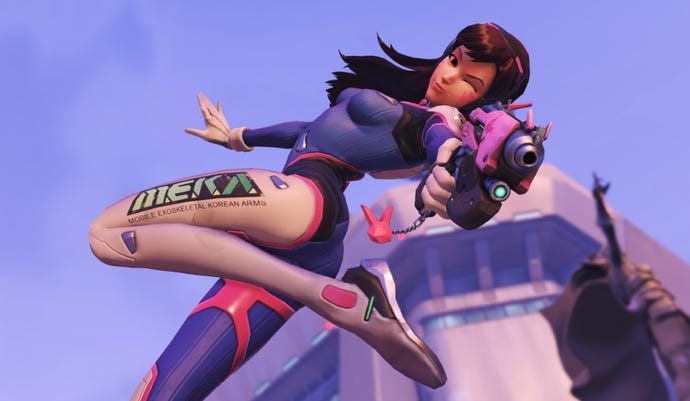






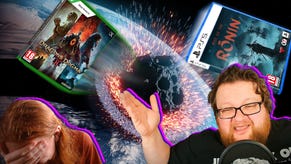
.jpg?width=291&height=164&fit=crop&quality=80&format=jpg&auto=webp)
